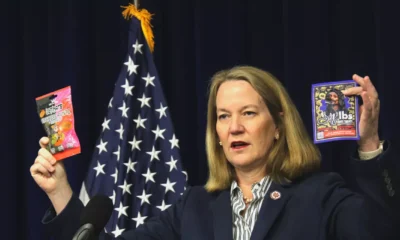budget
Republicans Propose Controversial Funding Plan for Arizona’s Disability Programs, Sparking Democratic Outrage

Arizona Republicans have pushed through a $122 million emergency funding bill aimed at the Division of Developmental Disabilities (DDD), despite strong opposition from Democrats, Governor Katie Hobbs, and advocates for the developmentally disabled community.
The urgency of the situation is clear. DDD is on the brink of running out of funds for caregiver salaries by the end of April, which threatens to leave thousands of families without essential state support.
“If we do not complete that task, around May, all the DDD programs in the state of Arizona will shut down,” said House Appropriations Committee Chairman Rep. David Livingston, R-Peoria, emphasizing the seriousness of the concern.
On April 14, both the House and Senate Appropriations committees endorsed twin bills, House Bill 2945 and Senate Bill 1734, that would allocate emergency funds. These measures saw party-line votes with some dissenting views among House Republicans.
In contrast to the Democrats’ calls for a straightforward funding solution, Republicans have proposed tapping into other resources. The bill intends to draw from the Housing Trust Fund and the Prescription Drug Rebate Fund to finance the emergency funding.
The distribution of funds is as follows:
- $38 million from the Housing Trust Fund.
- $10 million from the Arizona Commerce Authority Competes Fund.
- $74 million from the Prescription Drug Rebate Fund.
While Senate Republicans acknowledge the necessity of the funding, they also admit the bill needs refining to maintain support among their ranks.
“This is not a perfect bill, not even close,” stated Sen. Carine Werner, R-Scottsdale, stressing the need for policy safeguards alongside the funding.
Democrats have attempted to redirect the funding solely through general fund dollars, but their amendments faced rejection from Republican lawmakers.
Rep. Nancy Gutierrez, House Assistant Minority Leader, remarked, “If we can get this supplemental clean bill done, then we can come to the table in the budget process and talk about reforms.”
On the Senate floor, Sen. Lauren Kuby, D-Tempe, proposed a clean continuation amendment, only to see it dismissed by Republicans, who she claimed are setting the bill up for a veto.
Rep. Matt Gress, R-Phoenix, criticized the Democrats’ proposal as “financially irresponsible,” but hinted at the possibility of a bipartisan amendment emerging as discussions proceed.
House Majority Whip Julie Willoughby’s bipartisan amendment failed to secure a favorable vote in the House Appropriations Committee, impacting her emotional stance on behalf of affected families.
The amendment sought to ease approval for Arizona Health Care Cost Containment System waivers and address stringent hour limits for caregivers in the Parents as Paid Caregivers program.
During a passionate moment, Willoughby expressed her distress to families present at the committee hearing, stating, “I choose you as my hill to die on. I’m sorry this is happening to you.”
Concerns linger among constituents about the handling of DDD funding. Over 500 individuals voiced opposition to the bill, in stark contrast to a mere eight supporting it.
Michele Thorne, a parent and executive director of Care 4 the Caregivers, stressed the urgency of addressing the needs of families reliant on these crucial services.
Brandi Coon of the Raising Voices Coalition echoed these sentiments, urging bipartisan collaboration to amend the bills before they reach the Governor’s desk.
As negotiations draw on, Livingston expressed frustration at the lack of response from Hobbs’ team, citing missed opportunities for dialogue.
In conclusion, significant tension exists between party lines as Arizona legislators navigate the complexities of funding essential services for some of the state’s most vulnerable populations.


















